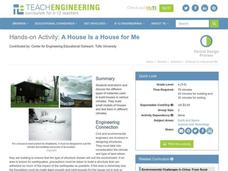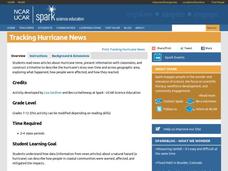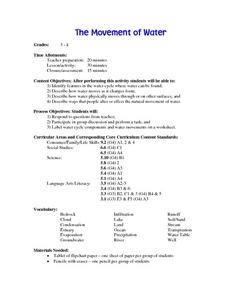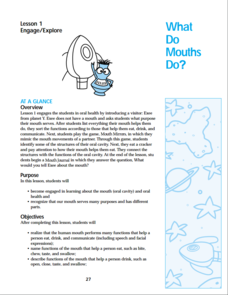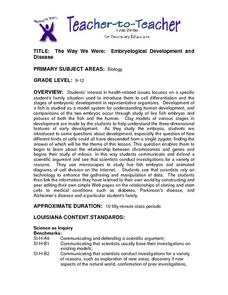Curated OER
Science: Not just Gold
Learners articulate a possible relationship between arsenic and gold deposits in a written statement using data to substantiate the relationship they describe. They use real data to determine the source of the arsenic in the drinking...
Curated OER
Science: Headline
Students are able to identify questions they need to answer to comprehend a specific news article. They are pushed to question how they know that their drinking water is safe.
Curated OER
Cooking with the Sun
Young scholars explore using energy from the sun for heating and cooking as they build and compare the performance of four solar cooker designs. This excellent two-day instructional activity has groups of students build and test a...
Center Science Education
Feeling the Heat
What is an urban heat island? Middle school meteorologists find out by comparing temperatures at different locations on campus. They relate their findings to what might be happening in a concrete jungle and how it impacts local weather....
Curated OER
Designing a Real Life Ecosystem!
Students research abiotic and biotic factors concerning the concept of an ecosystem. Record and analyze data collected. Write a lab report in proper and scientific format with thinking and analytical skills. Work as a cooperative team.
Curated OER
A House is a House for Me
Young scholars evaluate the impact climates have on the building of structures. They research the different types of materials used to build houses in various climates and build small models of houses which are tested against different...
Curated OER
Seeing and Feeling Sound Vibrations
Groups rotate through a series of stations and work with a partner to observe sound waves. Children describe sound in terms of pitch, volume, and frequency. To apply their new knowledge, the class considers how these observations can...
Curated OER
Peanut Butter and Jelly: The Importance of Detailed Procedures
Students write a list of steps to be taken in making a peanut butter and jelly sandwich. They observe as the instructor literally follows each step. After realizing the importance of clear communication, students write a scientific...
SRI International
Nanofiltration
How can everyone in the world have access to clean drinking water? Throughout the lesson, learners read about and listen to how water is filtered, what the filtration process removes, and the best ways to filter. They explore the...
Teach Engineering
The Grid
Upper graders form a "Presidential Task Force," and attempt to make recommendations concerning the future of the national power grid. After a teacher-led discussion which proves that our nation's energy consumption will soon outpace our...
Center Science Education
Tracking Hurricane News
Here is a unique twist for your lesson on hurricanes. After examining extreme weather news headlines, your storm chasers view a PowerPoint about hurricanes and then zoom in on Hurricane Irene. They map a timeline of her trek up the East...
Curated OER
The Movement of Water
Here is an excellent lesson plan on the water cycle and the states in which water exists. Learners identify the features of the water cycle, describe how water changes form, and look at ways that people affect the natural movement of...
Curated OER
How Hot Is It?
Discuss the difference between conduction, convection and radiation of thermal energy, and complete activities with your class by investigating the difference between temperature, thermal energy and the heat capacity of different materials.
Curated OER
Destination Outer Space
Students investigate space travel. In this space travel lesson students examine space exploration history, engineers and scientists involved in space exploration, and Newton's third law of motion. Students make rockets.
Curated OER
A Walk in the Tundra
Discuss the environment of the Arctic tundra using this resource. The focus of this lesson is the story A Walk in the Tundra by Rebecca L. Johnson. The appealing illustrations are bound to captivate your class! After reading the story,...
Curated OER
Earth Rocks!
Young scholars study the basic elements of the Earth's crust: rocks, soils and minerals. They categorize rocks, soils and minerals and how they are literally the foundation for our civilization. They also explore how engineers use rock...
Curated OER
Fortified Breakfast
Students reverse engineer a cereal. In this dietary lesson students identify the minerals that the human body needs to function. Students examine how foods are fortified by food engineers. Students find the amount of iron in a cereal by...
National Institutes of Health
Open Wide and Trek Inside
Don't underestimate the value of a clean mouth! Here is a six-lesson unit that details everything a youngster needs to know about oral hygiene. It includes lessons on the purpose of a mouth and teeth, the nature of oral bacteria and the...
Curated OER
The Way We Were: Embryological Development and Disease
Students use microscopes to study live fish embryos and animated diagrams of cell division on the Internet. They see that scientists rely on technology to enhance the gathering and manipulation of data. They create web pages on cloning.
Curated OER
Make Your Own Temperature Scale
Differentiate between temperature and thermal energy. Your class will build a thermometer using simple materials and develop their own scale for measuring temperature. Discuss with your class and consider why engineers need to understand...
Curated OER
Modern Day Pyramids
Learners investigate the ways in which ancient technologies - six types of simple machines and combinations - are used to construct modern buildings. As they work together to solve a design problem (designing and building a modern...
3D4Medical
iMuscle
Scientific names and the location of 95 muscles of the human body can be found on the three-dimensional animated man within this award-winning application. After identifying a muscle, delve into exercises that strengthen and stretch....
Curated OER
The Price of Power
Explore the current political debate over regulating power plant emissions. Critical thinkers research, formulate, and present arguments regarding selective catalytic reduction systems for coal-burning plants.
Curated OER
Selfless Service and The Giving Tree - Building Ethical Conscience
Upper elementary schoolers investigate philanthropy and selflessness by reading a children's book. For this ethics lesson, they read The Giving Tree by Shel Silverstein, and research Mahatma Gandhi's troublesome, yet inspiring, life....







